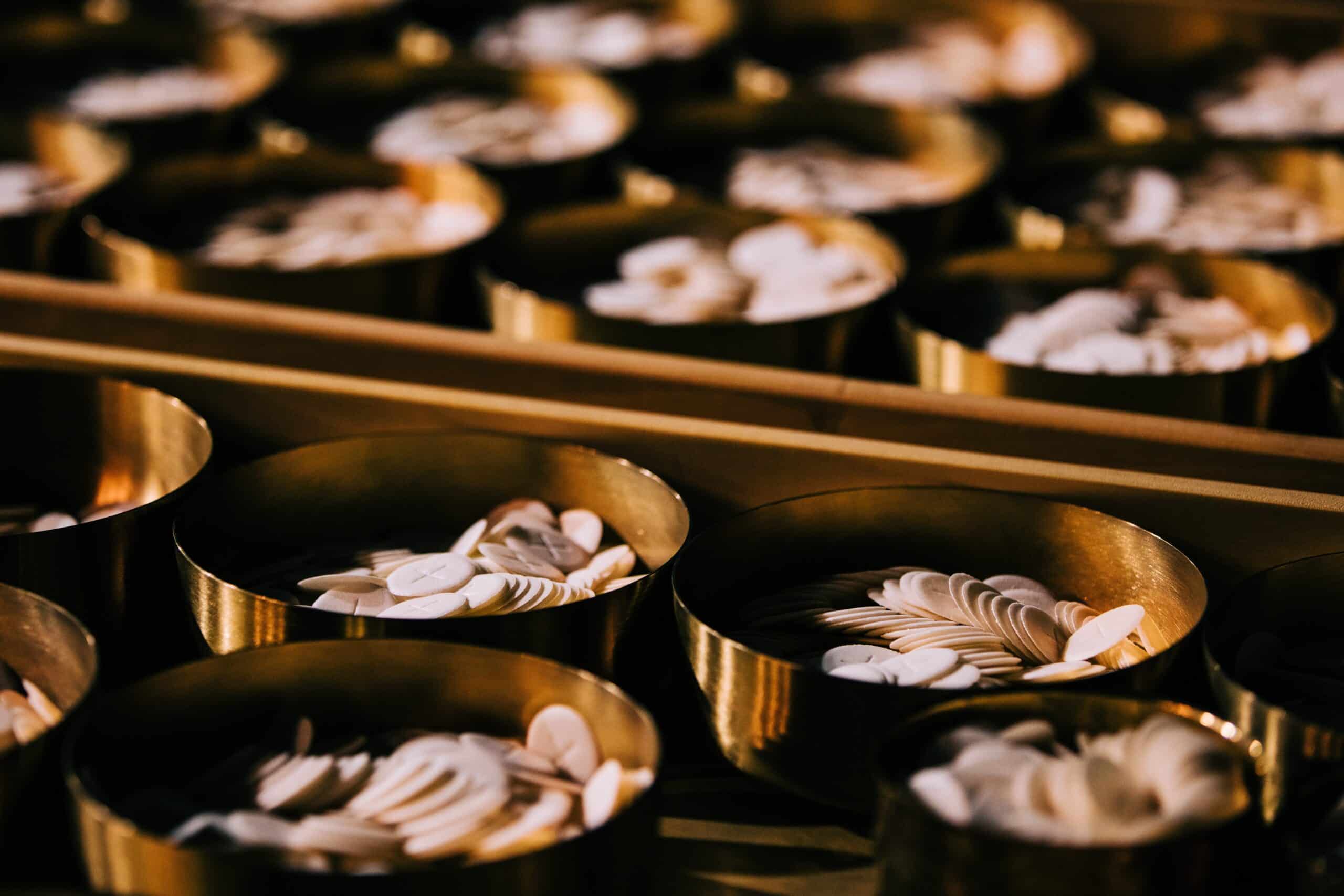The Church invites us to celebrate the Eucharist and to receive Holy Communion “often” and “worthily” (CCC 1389). The “often” part is encouraged because reception of Communion strengthens our bond with one another, nourishes God’s life within us, and incorporates us more deeply into the life of Jesus (CCC 1324). Thus, it is the ongoing Sacrament of Initiation (CCC 1322). The “worthily” part is a little more complicated.
What would make us worthy to receive Holy Communion? Simple answer: nothing. We are never worthy of so great a gift. But here’s the exciting part: God offers us this great sacrament freely. So why does the Church say we ought to receive Holy Communion worthily?
Since the sacrament is a source of unity and grace, we need to make sure we are capable and ready to be united and graced. And if we are not in full communion with God and the Church because of something we have done, we need to first get right with God and the Church. We need to fix our situation through the Sacrament of Reconciliation. In some cases, we need to change the way we are living.
What might some of these situations be? For instance, if we are engaging in business practices that cheat customers, destroying the reputation of someone, or if we are not participating at Mass on Sundays and Holy Days, we are running the risk of breaking our relationships with God and the Church.
But here’s the good news: As baptized persons, we are God’s daughters and sons. If we are willing to correct our situations, God and the Church are more than willing to forgive and take us back into full union. No questions asked. It is quite easy, but it does depend on our getting our relationships in right order. And then receiving Holy Communion is a clear and honest statement. And then can we say that we are receiving Holy Communion worthily.
Can a baptized person who is not Catholic receive Communion in a Catholic Church?
With a few exceptions, the simple answer is no. The reason is that the Eucharist is a Sacrament which both expresses and strengthens the person’s existing unity within the faith community. Thus, one must be a member of the Catholic faith community in order to participate fully in this sacrament.
In more formal terms, the Code of Canon Law states: “Because Catholics believe that the celebration of the Eucharist is a sign of the reality of the oneness of faith, life, and worship, members of those churches with whom we are not yet fully united are ordinarily not admitted to Holy Communion. Eucharistic sharing in exceptional circumstances by other Christians requires permission according to the directives of the diocesan bishop and the provisions of canon law” (canon 844 §4).
While an ecumenical spirit directs a lot of actions within and between the churches, intercommunion is not one of them. As a Lutheran friend once mentioned at the beginning of a church service, may the separation be a small sacrifice we all offer for the eventual unity of the churches.
It is not our tradition to offer the Precious Blood in small cups. Does the presence of Jesus in the consecrated wine preclude this concern?
I have two answers to the first question—one practical and the other theological. The practical one is a matter of cleanup. Since the consecrated wine is the Precious Blood of Jesus, each little cup would have to be purified after use. That could be a real problem, especially with a large crowd. The theological answer is a question of unity as we drink from a common cup. Receiving Communion is never an individual or private matter, but a common sharing in the blood of Jesus.
Thus, while we may need more than one cup at a Sunday Eucharist due to numbers, at least we maintain the symbolism and the sharing as many people drink from the same cup. Same with the consecrated bread, which is the Body of Christ. Many receive from the one paten or one ciborium and, thus, share in the Lord’s body.
The matter of spreading germs is a little trickier. While the wine truly becomes the blood of Jesus, it retains the accidents (or characteristics) of wine. It maintains its alcohol content, for instance, and its original color. So it does not become a “magic potion” against germs. However, few cases of the transmission of the flu or a cold have been reported and precautions are usually in place.
For example, wiping the lip of the cup after each recipient drinks from it. It may make sense, however, during flu season to refrain from receiving the Precious Blood. In some cases, dioceses stipulate that the blood of Jesus is not be given if there is some health situation in the area.
What is the correlation between this sacrament and a traditional meal?
When we think of a meal, we immediately think of food and drink, and someone to share them with over pleasant conversation. If the conversation is good, the sharing can become the focus of the whole meal as we enter into one another’s lives. But good food and drink play an important supportive role.
The Eucharist is a meal with the very same elements, but in a more stylized form. We come together to share bread and wine and to enter into conversation with the Lord as he speaks to us through the Scriptures, symbols, gestures, and prayer. The major difference, however, is that the food and drink become the Body and Blood of Christ and the focal point of the meal. This is due, in part, because the Eucharist is a sacrifice as well as a meal in which the death and resurrection of Jesus is offered to the Father.
How long must I fast before receiving the sacrament?
The general norm for Roman Catholics who plan to receive Holy Communion is to abstain for at least one hour from all food and drink, except water. Canon law immediately makes two exceptions. One is for priests who celebrate more than one Mass on the same day. They are to observe the fast before the first Mass. The other exception is for the elderly, infirm, and those who care for them. They can receive at any time even if they have eaten within the previous hour (cf. CIC, can. 919).
Do I have to confess my sins prior to receiving the Eucharist?
Only one who is conscious of having committed mortal sin is required to submit to the Sacrament of Reconciliation (cf. CCC, 1457). Thus, reception of absolution in the Sacrament of Reconciliation is not necessary before receiving Holy Communion unless one is conscious of having committed mortal sin.
We might make two caveats concerning this matter. Mortal sin is rare since it is a conscious decision to break away from God and the Church through a serious act, adequate appreciation of the seriousness of the act, and a significant degree of freedom in order to be able to say that one freely chose to do it. Seldom do we enjoy that degree of freedom and level of appreciation.
The second caveat is the fact that we are always free and encouraged to celebrate the Lord’s love and mercy in the Sacrament of Reconciliation at any time. We certainly don’t need to wait until we have sinned seriously to celebrate the sacrament.
How is the Eucharist a Sacrament of Initiation?
Just as people have to eat and drink in order to survive in good health, so our spiritual life needs to be continuously nourished in order to survive. The life begun at baptism and strengthened in confirmation is nourished and fed by the Eucharist. Thus, our initiation into God’s life is an ongoing process as we continue to grow in that life.









2 thoughts on “Understanding the Sacrament of the Eucharist”
I am in a state of anxiety. I can’t find a church who is willing to give me communion on the tongue. Please help me, I’m in a state of despair.
“In the United States, the body of Bishops has determined that “[t]he norm… is that Holy Communion is to be received standing, unless an individual member of the faithful wishes to receive Communion while kneeling” and that a bow is the act of reverence made by those receiving (no. 160). This norm is supported by an Instruction by the Holy See regarding the Eucharist: “In distributing Holy Communion it is to be remembered that ‘sacred ministers may not deny the sacraments to those who seek them in a reasonable manner, are rightly disposed, and are not prohibited by law from receiving them’ (Code of Canon Law, can. 843 § 1; cf. can. 915). Hence any baptized Catholic who is not prevented by law must be admitted to Holy Communion. Therefore, it is not licit to deny Holy Communion to any of Christ’s faithful solely on the grounds, for example, that the person wishes to receive the Eucharist kneeling or standing” (Redemptionis Sacramentum, no. 91).
Those who receive Communion may receive either in the hand or on the tongue, and the decision should be that of the individual receiving, not of the person distributing Communion.”
– https://www.usccb.org/prayer-and-worship/the-mass/order-of-mass/liturgy-of-the-eucharist/the-reception-of-holy-communion-at-mass